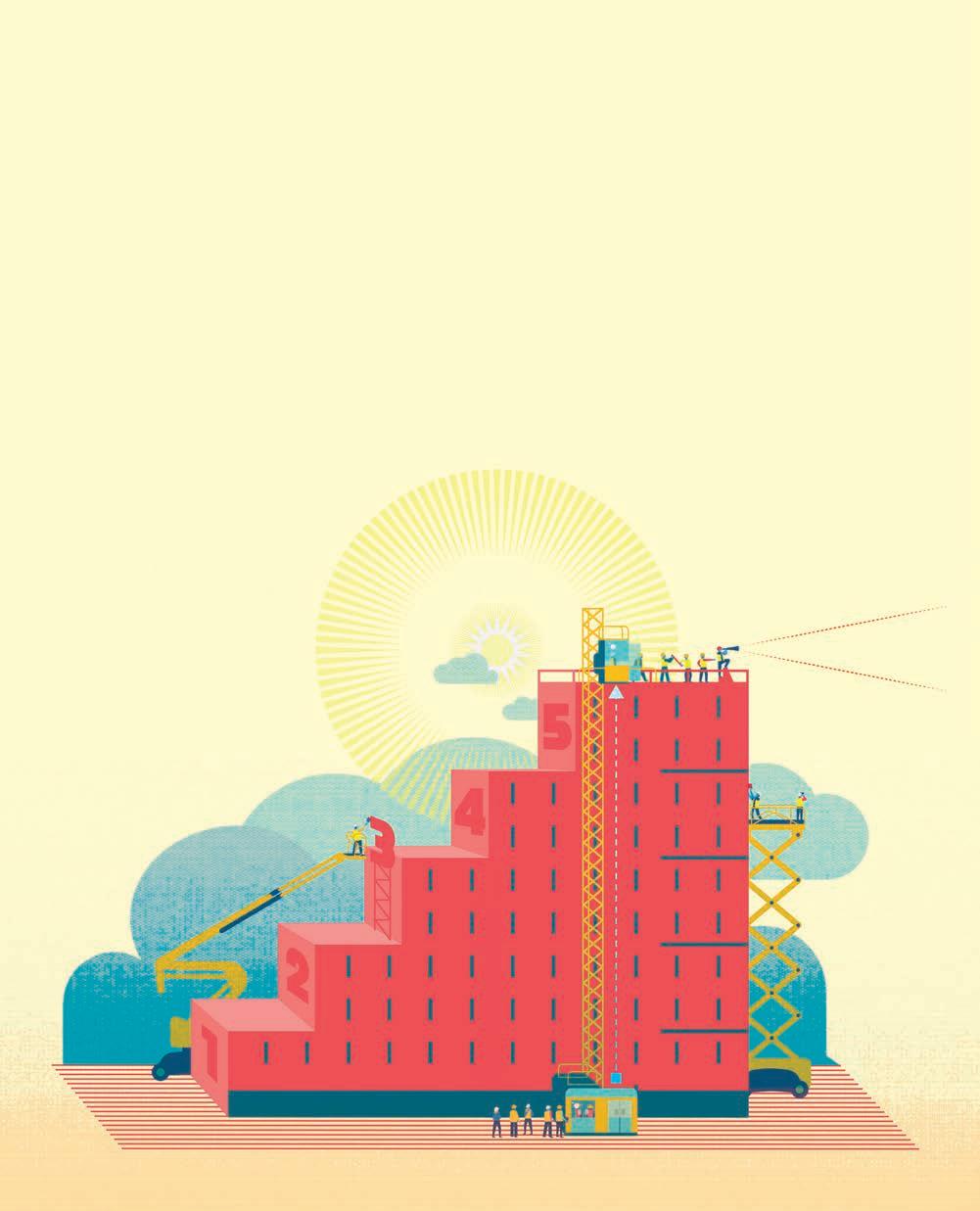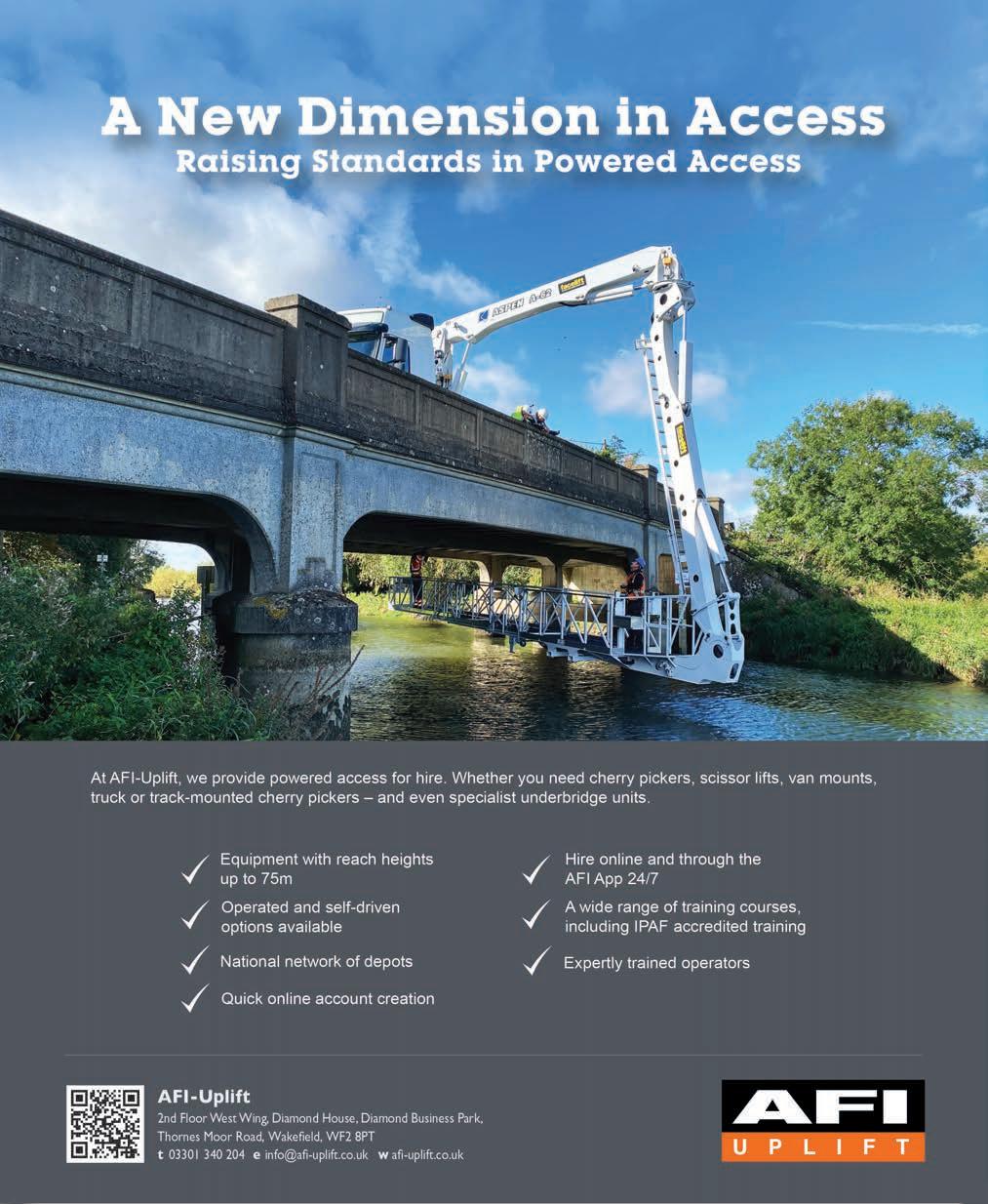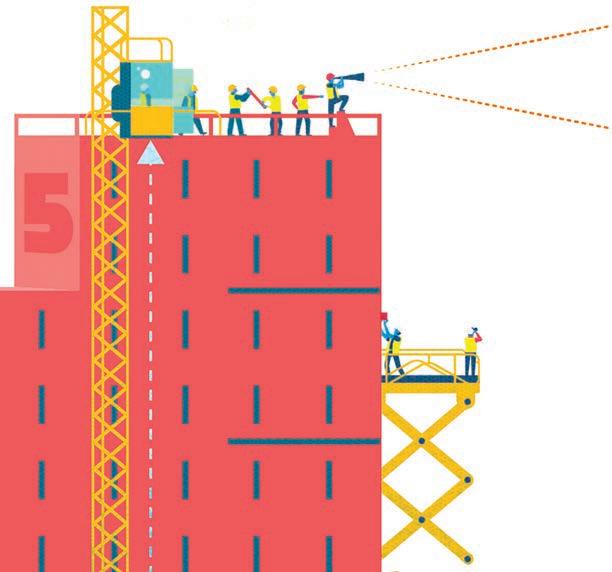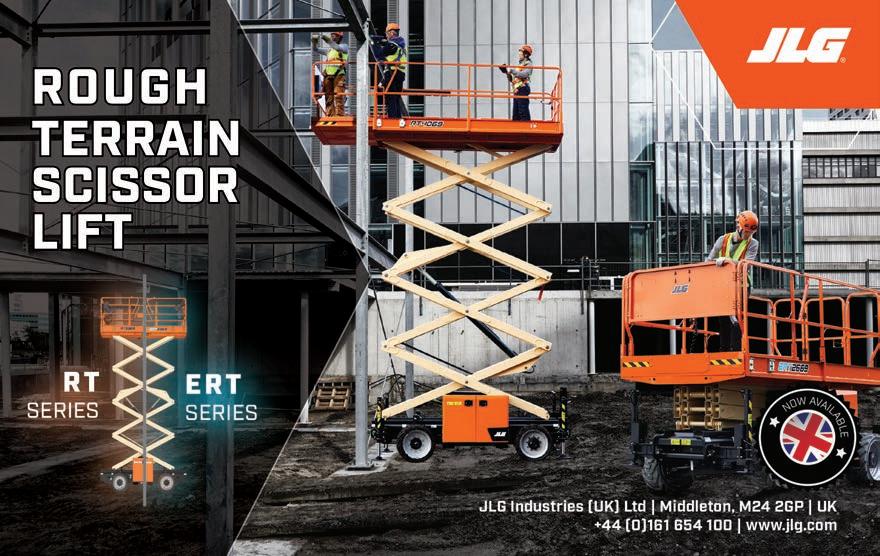
11 minute read
The big debate
A PROPERLY TRAINED WORKFORCE CAN BRING DIVIDENDS TO YOUR BUSINESS, AS WELL AS BOOSTING LEVELS OF EMPLOYEE SATISFACTION AND RETENTION. IPAF POWERED ACCESS BROUGHT TOGETHER A PANEL OF CONSTRUCTION CONTRACTORS AND HIRERS TO DISCUSS THE VALUE OF TRAINING IN POWERED ACCESS AND BEYOND
What are the benefits of having a properly trained workforce?
Advertisement
Paul Roddis (PR): From a legal perspective, compliance is critical. Everyone must comply with the law and the law requires that people are adequately trained. Within the UK, we have a whole raft of legislation which is crystal clear as far as this is concerned. Globally, we have the same sort of thing.
A trained operator is more skilled, more efficient and more effective. Equally, they are less likely to have an accident or an incident. They are more likely to spot if someone else is potentially working in a way that could be detrimental to the organisation. A trained operator will know the importance of a pre-use inspection and how to conduct one. These pre-use inspections reduce the likelihood of machines running out of fuel or not being properly charged. The benefits are enormous.
From the individual’s point of view, someone who is being trained will feel that the organisation that is training them cares about their wellbeing and wants to put them in a position where they can achieve things safely and go home safely. George Mosey (GM): From my perspective, having trained operators sets the standard across the individuals that are carrying out the task that they have been trained to do. It also provides a rigour around new entrants into the profession. If there wasn’t a standard or a baseline – which there isn’t in a lot of respects for a lot of tasks in the industry today – then an understanding of standards or competence is very hard to establish.
Training allows those individuals to have a sense of pride in the levels they have achieved. And it also stands them apart from those who haven’t quite invested themselves or haven’t had a company invest in them. It is healthy for the industry to have these standards as a prerequisite for people to come in and do certain tasks in what can be a very dynamic and risky work environment. David McNicholas (DM): George makes a really important point because the one thing about working at height with MEWPs is that IPAF provides an accredited framework. That means you know that people are delivering a consistent course to a consistent level.
We also provide telehandlers as part of our day-to-day business. It is a lot harder in that area to prove competence. Where it is harder to do something it means generally more people don’t do it. Customers really just want to know what is an appropriate standard. Andrew Hughes (AH): We are looking for ways to be able to qualitatively determine how well training is being delivered. There are fundamental things that you would expect anyone to have – however, the level of training and the degree of adherence to a set standard or a set level of norms is one thing, but there is always that gap between those who we know perform well and those who we know have the ticket. So the qualitative part of the training is paramount.
A trained operator will know the importance of a pre-use inspection and how to conduct one. The benefits are enormous
Paul Roddis, IPAF
↘ The panel
Andrew Hughes
Global health and safety director, ISG
George Mosey
Head of health, safety and environment (Europe), Laing O’Rourke
Paul Roddis
Training manager, IPAF
David McNicholas
Chief executive, AFI-Uplift
How do you check operators are properly trained, certified and meeting the standard?
DM: It is relatively easy where there is one go-to organisation, in this case IPAF, to check via the individual or via their training provider if you need to. I think it becomes a lot harder in other areas to assess people if you are not comfortable with the benchmark or standard of their training. PR: Absolutely. I think we are – I am going to use the term lucky, which is entirely incorrect – to have ISO 18878, which is a very specific international standard for MEWP training. But I think it is also important that that is a baseline. It is a place from which to develop and to grow, and hence we have developed a PAL+ advanced training course for those operators that perform well or are in higher-risk or more challenging environments.
As far as being able to check is concerned, IPAF is audited to ISO 18878 so we have some evidence there. But we also have our online PAL Card verification system, which is very straightforward, to combat forgeries. And we have introduced ePAL. This is an electronic version of the card, which can be shared through the app to employers, potential employers, construction sites. It is so easily verified and you haven’t got photocopies where it is slightly harder to guarantee that it’s genuine.
GM: I would add to what was just said there by Paul. I suspect our insurance premiums benefit from having established levels of competence and IPAF is providing those in the MEWP space. It is actually very handy from an organisational perspective. The insurance industry relies upon a level of standard and I think we would struggle if we lived in a world where there wasn’t a recognised baseline – we’d really struggle to be able to convince our insurance partners to support us in some of the high-risk work that we do. AH: I would put a slightly different spin on it. In the latter half of last year, we found it very difficult to find the right number of competent people. That placed a lot of emphasis on ensuring that the people we did have on site were competent and capable and could demonstrate that. That was not just in work at height but across the board.
Our challenge became easier when we focused on the pre-induction phase and started to understand in detail just who we were dealing with. It was brought to light by the fact that, in the changeable nature of work, you end up with certain situations developing.
For example, a scaffold is provided by one contractor and they provide the right people to put it up. When it comes to striking that same scaffold, it may be that less capable people are supplied to do it and we have an incident. And so we are sometimes perhaps guilty of certain assumptions when in reality it’s a complex issue to manage the movement of people in and out. And there is some reliance on the supply chain to be able to deliver those capable and competent people.

Why should operators be encouraged to log their experience and what more can be done to get them to do this?
GM: An ability to evidence continuous professional development and hours logged are in my mind one and the same thing. Achieving a qualification such as a driving licence or ticket or an IPAF card is clearly an important step, however thereafter we have huge variety in levels of aptitude or competence. Someone might have used a certain type of machine for a good while but maybe doesn’t have the experience in other areas. So it is good to log time served on individual bits of componentry.
It is countless the number of times that we’ve analysed an incident and found that the individual was qualified but wasn’t overly familiar [with the machine] and actually we had probably failed to check that familiarisation because we weren’t accurately logging hours accrued. We are working with aviation specialists at the moment and for pilots it is all about flight time. That actually tells you more about their competence than the fact that they just have a licence and are able to use a piece of kit. The industry has a lot more to do in this space. DM: It’s absolutely vital. Even for people working within the industry who are working with particular machines all the time, it’s something that we need to constantly be encouraging. I think it’s a wider issue then just working at height. AH: There are many elements around how you ensure people stay current. Not just through relative experience or training but currency and understanding of the latest developments in technology. Because technology is advancing quite quickly. PR: It is difficult to make people understand the value of familiarisation and experience and how it all strings together. General MEWP operator training is a baseline from which to build. We found that people don’t want to fill in paper log books, which they find inconvenient. That is why with ePAL we have this very quick and convenient log book. It takes seconds now and the beauty of that is it can be shared really easily. So that in itself allows you to determine who might be the right person to use on these larger or more complex machines. DM: Logging experience is a real challenge because to be frank most people who go into these jobs did it because they didn’t like being in the office, or paperwork. It has to become habit. PR: Absolutely right – and that is why we have tried to make it so easy because we have realised no-one wants to walk around with a pen and paper. But they will walk around with a phone.
George Mosey, Laing O’Rourke
How does training people help with retention?
GM: People want to be associated with something professional and that is helpful from a retention perspective. If employers are able to invest in

their people with training, then that clearly will make that employer more attractive. It can serve as a roadmap for employees. It’s good not only for their own personal professional development but there are benefits back to the business. I think we would see a lot more nomadic actors within the industry if we didn’t have these anchors. AH: It is fundamental to ensuring you have a solid base of people that you can depend upon. We certainly know that the opposite is true. If you have high turnover in your business then you are more likely to have to retrain and it costs you more money in the long run. DM: I think it certainly allows you to be more dynamic as an organisation because training is all part of showing pathways to people. If you don’t train people, they tend to hit ceilings in their positions and then leave anyway. PR: Pathways is exactly the right term. Within training you are able to discover your higher-performing employees, potentially upskill them to, for example, PAL+ at a higher level which gives them that sense of pride. These high-performing employees can also be mentors to others who aren’t necessarily so well performing. That has a beautiful circular knockon effect which increases morale, skills, and hopefully those behaviours and loyalty.
Should team members other than operators receive training?
DM: Yes is the easy answer. There are different types of training. There is training for management because the manager on a project site will be responsible for planning, supervising, managing. They may not need to know the intricacies of how a machine works. But I think there needs to be awareness, particularly when it comes to working at height. There may be rescue plans that may involve somebody being aware of how to get somebody down from height. PR: One of my greatest frustrations and instructors’ greatest frustrations is the amount of operators they train who say: “Oh, you need to tell my boss this.” Companies know they need to train operators but they don’t necessarily train the supervisors, managers and planners.
An example of this is blanket policies around harnesses. Sometimes wearing a harness in a vertical platform can increase risk because of the residual risk around not being able to observe correctly. A manager or a planner does not need to operate a MEWP. But they need to understand the legalities and the implications. AH: We rely sometimes on supervisory staff – and management in particular – to lead investigations and different types of event management where they don’t have a basic understanding of the technological issues involved, and it is quite clear to me that in many cases a lack of training is identified as a cause.
Understanding the context within which that sits – it is never just about a lack of training. It might be that the person was trained but has acted differently through some form of contextual thing that is happening on site on that particular day. We lose those opportunities if someone doesn’t have a basic understanding of the technical requirements. GM: Having professionally qualified people is just so important. So I hugely endorse what IPAF has created. It has become a recognised standard. And of course, from an industry perspective, we need to think about how else we can do similar things in other spaces because it talks to the health of our industry.

David McNicholas, AFI-Uplift











